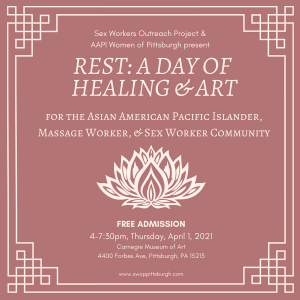Sex Workers Seek Justice Online
 There’s a movement that’s happening. Sex workers have been fighting for decriminalization for generations. Lena Chen, Chinese American performance artist, writer, and activist; and Maggie Oates, who works at the intersection of art, privacy, and computing technology, building containers that facilitate collaborative play and intimacy, are the creators behind OnlyBans, an interactive game that critically examines the policing of marginalized bodies and sexual labor. The artists will present a play through of the game with Kelly Strayhorn Theater as their virtual Freshworks Residency Presentation on Friday, April 2, 2021 at 7:00pm on Zoom!
There’s a movement that’s happening. Sex workers have been fighting for decriminalization for generations. Lena Chen, Chinese American performance artist, writer, and activist; and Maggie Oates, who works at the intersection of art, privacy, and computing technology, building containers that facilitate collaborative play and intimacy, are the creators behind OnlyBans, an interactive game that critically examines the policing of marginalized bodies and sexual labor. The artists will present a play through of the game with Kelly Strayhorn Theater as their virtual Freshworks Residency Presentation on Friday, April 2, 2021 at 7:00pm on Zoom!
Many people use the internet to promote their activities and events, amplify the work and good news of others, see what others are doing, and scroll for enjoyment. They accept the social media platform’s attempt to “control content” as a form of adding order to the platforms and even providing additional online security. The reality is that this is one form of censorship that targets sex workers and other industries.
In fact, sex workers face higher levels of stigma and discrimination than those in other service professions. And you can thank the United States Congress for that!
In 2018, President Trump signed into law a set of controversial bills intended to curb illegal sex trafficking online. Both bills — the House bill known as FOSTA, the Fight Online Sex Trafficking Act, and the Senate bill, SESTA, the Stop Enabling Sex Traffickers Act — have been hailed by advocates as a victory for sex trafficking victims, though their efficacy has been questioned by critics – including American Civil Liberties Union and Electronic Frontier Foundation who warn of threat to free speech.
The bills also poked a huge hole in the Section 230 of the 1996 Communications Decency Act. Known as “Section 230” and generally seen as one of the most important pieces of internet legislation ever created, it holds that “no provider or user of an interactive computer service shall be treated as the publisher or speaker of any information provided by another information content provider.” In other words, Section 230 has allowed the internet to thrive on user-generated content without holding platforms and ISPs responsible for whatever those users might create.
“The Internet has long been celebrated as a limitless realm of free expression, but this digital wonderland is becoming increasingly oppressive to those who express their sexuality as part of their art, activism, or work,” Freshworks artist Lena Chen explained.
FOSTA-SESTA creates an exception to Section 230 that means website publishers would be responsible if third parties are found to be posting ads for sexula services — including consensual sex work — on their platforms. While the legislation purports to end trafficking, what FOSTA-SESTA has actually done is create confusion and immediate repercussions among a range of internet sites as they grapple with the ruling’s sweeping language.
In the aftermath, numerous websites took action to censor or ban parts of their platforms in response (remember Craigslist’s Personals section?) – not because those parts of the sites were promoting ads for sexual services, but because monitoring potentially unlawful content was too hard.
So, who is a sex worker?
Turns out that “sex work” is a broad category; and OnlyBans will spotlight a specific area. “We are focused on people who are advertising their services online and people who may be selling digital content,” Maggie said.
If you didn’t catch it, OnlyBans, is a play on “Only Fans,” which is a content subscription service where content creators can earn money from users who subscribe to their content as “fans.” The site is popular in the adult entertainment industry.
So, how does the digital performance game work?
Assuming the role of a sex worker, players attempt to establish an online fanbase and earn money through posting sexy images provided in the game. Players encounter content moderation algorithms, shadow-banning, “real name” policies, facial recognition software, and other threats based on actual experiences of sex workers. As their content gets flagged, they discover just how “free” the internet really is when you are engaged in stigmatized labor subject to policing and criminalization.
“OnlyBans offers a speculative vision of how marginalized communities might band together to protest these unjust policies and create better alternatives,” Lena said.
Built on Twine, OnlyBans incorporates actual images from real-life sex workers who have been censored and deplatformed by social media companies. “We hope this interactive experience can educate and entertain viewers through combining the aesthetics of social media with real knowledge and engaging storytelling,” Maggie said.
The game prototype was initially developed by Lena Chen with Open Data Institute’s Violeta Mezeklieva through a residency with Polis180 (Berlin). Now as artists-in-residence at Kelly Strayhorn Theater (Pittsburgh), Lena, Maggie, and their collaborator Goofy Toof are revamping both the gameplay and visual design. OnlyBans incorporates research from Hacking//Hustling’s study on content moderation “Posting Into The Void” and draws inspiration from Lien Tran’s social impact game on condom criminalization “Cops & Rubbers.”
To experience OnlyBans yourself, visit Kelly-Strayhorn.org to purchase your Pay What Makes You Happy! ticket and join us on Friday, April 2 at 7:00pm.
In addition, given the March 16 racially and misogynistically motivated massacre in Atlanta that intersects with the issues of OnlyBans, we share this message from Chen and affirm our institutional and individual solidarity with Asian, Asian American, and Pacific Islander communities, immigrants, sex workers, and marginalized people around the world.
“As the daughter of Chinese immigrants, as a trauma survivor, and as a sex worker, I see elements of my own story in the lives of the victims in Atlanta.
Their murders were the consequence of a culture that has normalized sexual shame, gender-based violence, and xenophobic fear-mongering.
Digital surveillance and deplatforming is intertwined with state sanctioned violence and discrimination against sex workers, such as police raids leading to the arrest, deportation, and deaths of migrant massage parlor workers.
Research shows that increased policing, whether on the streets or on the Internet, only endangers sex workers further. Decriminalization is the most effective approach to ensuring the safety and autonomy of sex workers.
The killings in Atlanta are a traumatic reminder of the violence faced by AAPI and sex worker communities everyday. I hope we can take this moment to rest and to care for ourselves and each other. As we move forward, we must work in collaboration with those directly harmed by policies that continue to stigmatize and criminalize our existence.”
Please support these organizations which serve Asian migrant massage workers:
Red Canary Song
Butterfly
Massage Parlor Outreach Project
CHECK OUT THIS RELATED EVENT
In response to the violence in Atlanta, Lena is co-organizing a day of healing and art with Sex Workers Outreach Project Pittsburgh and women AAPI artists and organizers. The event will feature free wellness services donated by community members. If you would like to volunteer, donate a service or product (for care packages to be distributed at Asian-owned massage businesses), or offer financial support, please contact swop.pittsburgh@gmail.com.
 REST: A Day of Healing & Art
REST: A Day of Healing & Art
For The Asian American Pacific Islander, Massage Worker, & Sex Worker Community
Featuring Massage, Herbal Medicine, Acupuncture, Yoga, Reiki, Workshops, Music, Children’s Activities, and more!
Free Admission
Thursday, April 1, 4:00pm – 7:30pm
Carnegie Museum of Art
4400 Forbes Ave, Pittsburgh, PA 15213
Hosted by Sex Workers Outreach Project + AAPI women of Pittsburgh with support from Carnegie Museum of Art, Office of Public Art, Intersectional Health Collaboration Summit, & Heal Her.
